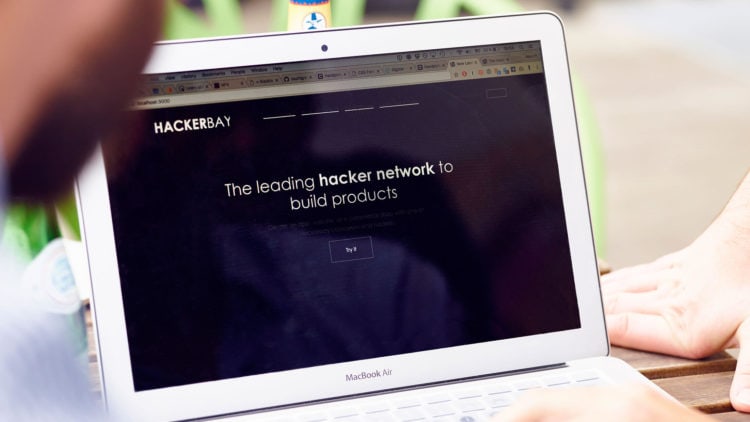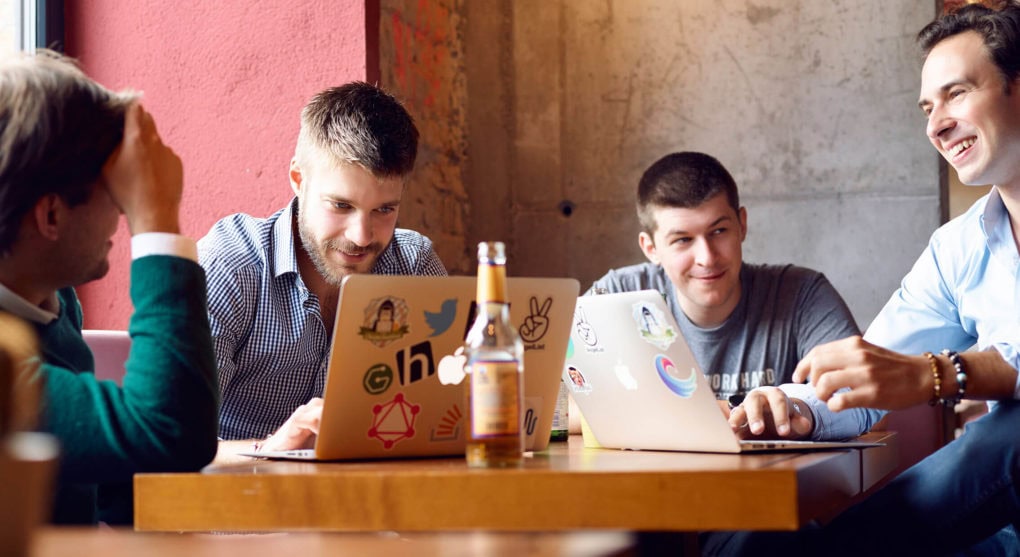
February 23, 2017
How Berlin Startup Hackerbay Conquered Silicon Valley
Shortly after launching their first company from Berlin, Christian and Michael Strobl, Marc Seitz and Tobias Jost hacked their way into Silicon Valley. The four guys received $220,000 in funding and spent several months under the mentorship of US Accelerator NFX Guild. Freshly back in Berlin and headquartered at Factory, Hackerbay already counts Twitter, Facebook and Lyft among its clients.

“Our goal is to empower hackers to play with the big fish, work on the toughest challenges and digitalize entire companies.”
You started out in Berlin. Was it a conscious decision to relocate to San Francisco?
Going to the US was never explicitly our goal. We didn’t need to relocate. Actually, I think Berlin is one of the best places to live. However, we were struggling to find local partners and investors who had a clear understanding of what we were trying to build. We had to explain what a market network is to every investor we talked to. This term was actually invented by Silicon Valley legend James Currier, founder of plenty of successful startups and partner at the Palo Alto based VC firm NFX Guild. Having realized that we need a mentor like him, we still had one more obstacle to overcome… The thing is that you can’t simply apply to get into NFX, but you need a personal invitation code. We didn’t have one, so we decided to hack into their system. We reset James Currier’s password and sent him a message explaining who we are and why we did this. It was a make-it-or-break-it kind of moment. Luckily, he was excited to hear about the crazy German entrepreneurs who are so determined to build something groundbreaking that they came up with highly unconventional and creative solutions to get there.
We were accepted to NFX’s 2016 Summer Program. The message was clear, we’ve been told that if we want to start a company that has the potential to transform an entire industry, we have to be in the Valley. We took this advice seriously and moved to San Francisco.
How does the startup ecosystem in Silicon Valley differ from the ones in Europe?
The difference lies in the scale and the network. San Francisco is unique when it comes to knowledge, experience, and above else, speed. I’ve never seen such speed before. The moment someone starts pursuing a new business idea, they don’t stop.
You see the Facebooks and Ubers growing billions in revenue quarter over quarter, and yet constantly getting faster and bigger. Whatever genius idea you might have to disrupt a specific market, you can be sure that these giants are already testing it. Whatever stage you’re at, there are companies who already went through the same things you’re going through right now. Your only chance to survive is to keep up with their pace and be unemotional when it comes to iterations, tough decisions and competition.
In Europe the scale is much smaller and that critical mass is nowhere to be found yet. In the Valley everyone is connected, there’s the PayPal mafia, and there are hundreds of entrepreneurs who support each other and push each other to the limit.
“Whatever genius idea you might have, you can be sure that the Silicon Valley giants are already testing it.”
How did your experience in the US shape your approach to building your business?
“Start as fast as you can and accelerate faster”, this is the number one rule entrepreneurs follow in Silicon Valley. You stick to very professional, step-by-step processes for product and brand building. You start with the basics: company name, logo and tagline. Then you work on them, iterate and instantly move on to the next task.
Our investors made the observation that our initial company name (Build Me This App) won’t inspire anyone, so we had 30 iterations on the name only. Coming up with a big variety of creative ideas wasn’t enough though, we tested each and every one of them on social media, conducted user interviews and even hit the streets to ask people in person and track their reactions. It took us two weeks to finally come up with the name Hackerbay, at which point we felt quite proud. Instead of the pat on the back we so naively expected, the NFX team instructed us to move on to the next project. Don’t get me wrong, their intention was not to pressure us, but to push us to build an exceptional product. It’s just amazing to work with the best people in the industry and James, Gigi, Stan and Pete really have been supporting us 24/7.
Do you think Berlin based startups and their US counterparts have an equal chance to reach a global audience?
Whether location matters or not depends on the market you’re in and the product you’re building. I do believe that you can start a software company basically anywhere. In our specific case we felt we had to win over Silicon Valley first, build up a brand there and then branch out.
In general, US companies tend to be pragmatic and don’t really care where you started out. If you’re relevant for them, they will want you in their market.

“We’d like to inject the knowledge we acquired in Silicon Valley to the Berlin market.”
What’s Hackerbay’s mission?
With our previous company, Hackevents, we’ve managed to build a network of brilliant hackers. Now our goal is to empower them to play with the big fish, work on the toughest challenges, digitalize entire companies and get them ready for the future. Our platform takes away all the unnecessary hustle from them, and lets them focus on what they’re really good at — coding and building great products.
This mission was reflected in our core values right from the beginning. During our time in the US, we used parts of our funding to rent a massive mansion in San Francisco. The idea was to be able to accommodate our hacker friends from Europe, whenever they come over to the US. On average, we had a dozen hackers sleeping in our apartment at once.
We’re also advocates of the hacker culture. Outside Silicon Valley, the word “hacker” often still has a fairly negative connotation. In the media, hackers are portrayed as the bad guys who steal your data. Inside Silicon Valley, hacking simply means building something quickly and testing the boundaries of what can be done. Mark Zuckerberg calls Facebook “the hacker company” and what could be a better reflection of this than the fact that the address of Facebook’s headquarters in Menlo Park is 1, Hacker Way. We’d love to globalize this sentiment.
You’ve recently opened up an office at Factory Berlin. What’s next?
Yeah, we’re back at Factory and it feels like home. We’d like to pay it forward and inject the knowledge we acquired in Silicon Valley to the local market and help Berlin based companies iterate faster and be more competitive. Berlin definitely has the talent, and the network effect is already working at hubs like Factory. Smart people attract smart people.

